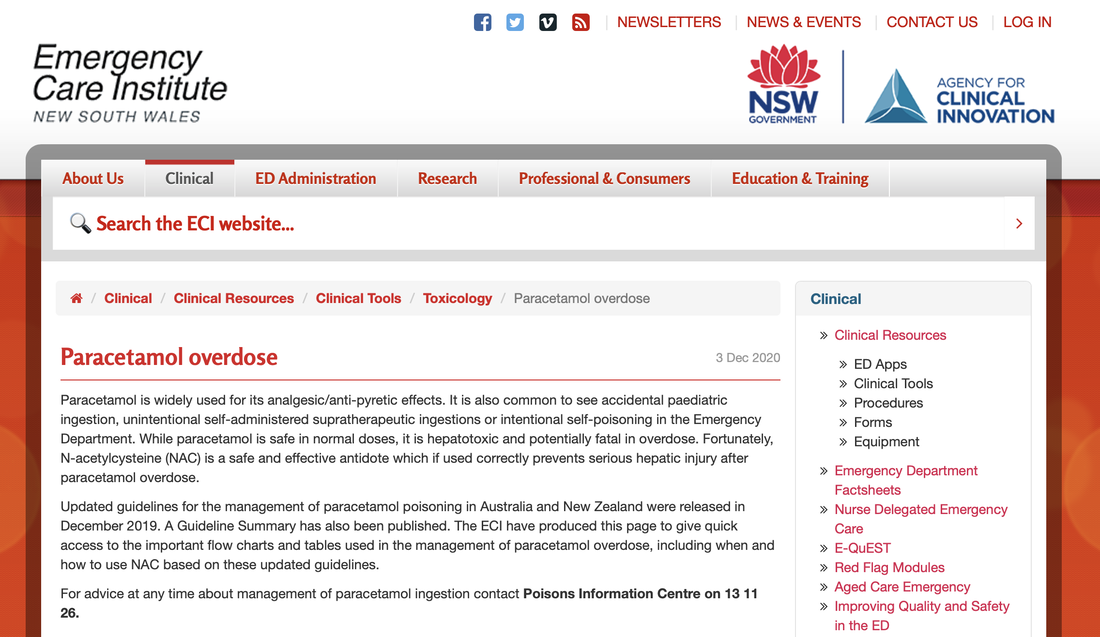MODULE 19: toxicology i
watch.
|
|
|
READ
A couple of things for you to read:
- The new summary guidelines (December 2019) for management of paracetamol overdose: these are high risk of appearing on an imminent exam and you must know them. We've linked the the ECI summary of the new guidelines, which is really well written from the perspective of exam preparation.
- Something Luke wrote a while ago that is a useful summation of Amanita Phalloides toxicity (which is interesting, and poorly described in most textbooks, but probably not going to appear in detail on the exam).
- T is for Tox: It's the fellowshipexam.com summary of the important toxicological issues. You can work through it and annotate your own notes over this week and next week.
| t_is_for_tox.pdf |
solve.
Probably the most important things to understand in ED toxicology are the roles of different therapies that can be applied. The toxicology handbook (Murray, Daly, Litte & Cadogan) covers these extensively, and lifeinthefastlane has popularised the RSI-DEAD mnemonic. The handbook's a cracker, but covers everything in minute detail, and you need to keep in mind that this is a FACEM exam, not a consultant toxicologic exam. The absolute need to know stuff is twofold:
This week, we are going to cover general therapies. These include decontamination and enhanced elimination.
Therapies across the two groups include:
So, for this module please solve the following:
1. Define decontamination and enhanced elimination.
2. Classify the five therapies above into the correct categories
3. For each therapy delineate a rationale for its use, and list the common FACEM exam drugs (in your opinion) that it would apply to.
You need to have this straight in your minds before you sit a toxicology question.
- The role of general therapies
- Specific details of antidotes where they exist.
This week, we are going to cover general therapies. These include decontamination and enhanced elimination.
Therapies across the two groups include:
- Single dose charcoal
- Multi dose activated charcoal
- Gastric Lavage
- Haemodialysis/haemoperfusion
- Whole bowel irrigation.
So, for this module please solve the following:
1. Define decontamination and enhanced elimination.
2. Classify the five therapies above into the correct categories
3. For each therapy delineate a rationale for its use, and list the common FACEM exam drugs (in your opinion) that it would apply to.
You need to have this straight in your minds before you sit a toxicology question.
SOLVE - 2.
A 66 year old man presents with abdominal pain and dizziness to your emergency department. He has a history of type 2 diabetes treated with dapagliflozin. The following vital signs are taken:
HR 110/min
BP 130/80mmHg
RR 35/min
Sats 99% RA
T 36.7 oC
BSL 3.6mmol/L
Ketones 3.4
As part of his initial workup a venous gas is taken.
The results are shown below.
pH 7.18
PCO2 32 mmHg
HCO3- 16 mmol/L
Lactate 1.6 mmol/L
Glucose 35 mmol/L
Na+ 140 mmol/L
Cl- 104 mmol/L
This is an important emerging medication side effect, not yet listed in tox handbooks, but one that we think it’s time to make students aware of.
So, ask yourself – what is going on? And what are you going to do about it???
Write down your interpretation of the ABG, and list some treatment actions that you’ll undertake.
HR 110/min
BP 130/80mmHg
RR 35/min
Sats 99% RA
T 36.7 oC
BSL 3.6mmol/L
Ketones 3.4
As part of his initial workup a venous gas is taken.
The results are shown below.
pH 7.18
PCO2 32 mmHg
HCO3- 16 mmol/L
Lactate 1.6 mmol/L
Glucose 35 mmol/L
Na+ 140 mmol/L
Cl- 104 mmol/L
This is an important emerging medication side effect, not yet listed in tox handbooks, but one that we think it’s time to make students aware of.
So, ask yourself – what is going on? And what are you going to do about it???
Write down your interpretation of the ABG, and list some treatment actions that you’ll undertake.
write.
Write 5 toxicology MCQs (they are a favourite topic). Write 2 SAQs: one on differential diagnosis using a prop, and the other on management.

